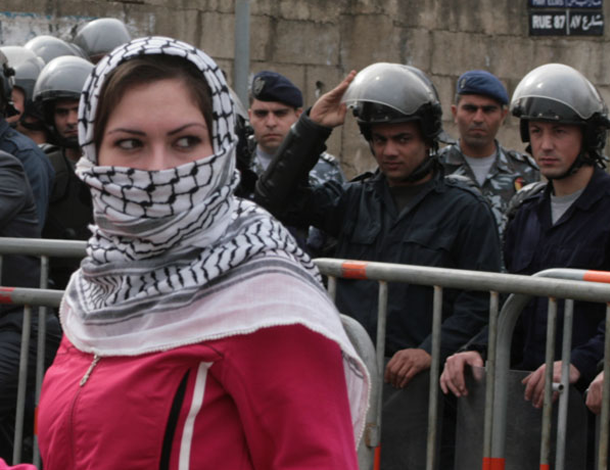If Mozn Hassan and other activists are not able to continue their work for human rights the road towards gender equality and long-term stability in Egypt is not within reach.
When the Women Human Rights Defenders (WHRD) Regional Coalition for Middle East and North Africa met last month in Beirut, one seat was noticeably empty. While completing departure procedures at Cairo International Airport, authorities informed Mozn Hassan –passionate activist, co-founder and North Africa advisor for the Coalition, and executive director of the inspirational Nazra for Feminist Studies - that she was banned from travel.
Mozn Hassan’s prominence as a leading Egyptian feminist and human rights defender was well summed up in a March 2016 article by Brian Dooley, who wrote, “Some people are so well known in their field, or beyond, that they’re only referred to by their first name.”
He goes on to illustrate how Mozn Hassan is just such a person. To many of us who work with non-governmental organisations or wider social movements to promote and protect fundamental rights, and among the women she advocates for, this tenacious activist is merely Mozn - a sister, ally, friend and mentor.
Founded by Mozn in 2007, Nazra for Feminist Studies brings together men, women and others to confront many contentious gender-based issues from a feminist perspective. For example, Nazra provides psychological, medical and other vital support for survivors of sexual violence in the public sphere in Egypt, such as in the terrible cases of mob sexual assault and gang rapes on the Tahrir Square in Cairo.

Mozn and Nazra also tirelessly call for the release of prominent Egyptian women human rights defenders such as Mahienour el-Massry and Sana Seif, and encourage active participation of women in decision-making processes not only in Egypt, but the wider Middle East and North Africa (MENA). Mozn inspires countless feminist activists in Egypt and beyond with her unique vision, commitment and authentic strategies to confront gender based discrimination and violence in MENA.
Mozn and fellow activists established the WHRD MENA Coalition in March 2014, to collectively respond to common concerns and problems in a highly polarized regional context characterised by sectarian violence and competing interests. The Coalition convened the recent executive committee meeting to discuss strategies to protect WHRDs struggling each day in the MENA region to exist against all odds.
A travel ban is not a new tactic by the Egyptian government. Such bans are routinely invoked by the government to suppress dissenting voices and attempt to silence the women’s rights movement in Egypt. The ban is a deliberate attack to prevent a unique and strong collaboration among women human rights defenders in MENA from flourishing.
The travel ban of Mozn Hassan comes within the context of Case No. 173 more popularly known as the "NGO Foreign Funding Case". In 2011 the Egyptian government commenced an inquiry to look into the foreign funding of NGOs and determine which NGOs weren’t properly registered under Law 84, a draconian Mubarak-era legislation for micromanaging the operations of human rights organisations.
The Law undoubtedly contradicts with Egypt’s international commitments through the International Covenant on Civil and Political Rights (ICCPR) to respect and protect civic freedoms. If charged under Article 78 of the Egyptian Penal Code, Mozn and other NGO leaders could receive life-time imprisonment for receiving foreign funding for activities “harming national interests”. Nazra, an internationally acclaimed NGO with accreditation to the UN, has not been operating illegally or covertly but merely tried to improve the situation for women in Egypt. The case is nothing but a judicial debacle with no legitimacy invoked to destabilize the very legitimate human rights advocacy and gender justice struggle of Mozn and Nazra.
Women Human Rights Defenders advance the rights of some of the most marginalized and stigmatized populations, as found in the 2016 State of Civil Society Report.
Yet, WHRDS face “significant risks in the work that they do. For many, demanding rights for women or simply being a woman activist can be life threatening.”
The work that Mozn does in Egypt is no exception. The international feminist movements, and human rights community is outraged by this senseless attack against Mozn’s work. What is extremely worrying is the extent of double standards in diplomatic relations with Egypt, evident in the silence in response to the ongoing attacks against socially conscious citizens in Egypt.
The lack of diplomatic support for Mozn and others targeted through the Foreign Funding case is short sighted. Instead of turning their backs on committed Egyptian activists, so called western democracies must acknowledge the legitimacy of activists who use non-violent and rightful means to build dialogue, peace and advocate for fundamental rights including women’s rights in the MENA.
Mozn, Nazra and other civil society actors can be a foremost part of rebuilding a polarized and war torn region, leading the way for citizen participation and making the voices of women of MENA heard, loud and clear. However, if Mozn Hassan and other activists are not able to continue their work for human rights, including women’s rights, the road towards gender equality and long-term stability in Egypt is not within reach.
This article was originally published on the Open Democracy website
